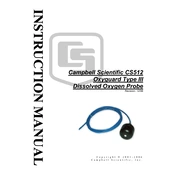Campbell Scientific CS512 Instruction Manual


To install the CS512 Probe, ensure that it is securely fastened to a stable structure using the provided mounting hardware. Connect the probe to your data logger using the recommended cables, and verify that all connections are tight and free from corrosion.
First, check all cable connections for damage or corrosion. Ensure that the data logger and probe are configured correctly. Test the probe in a known standard solution to verify its accuracy. If issues persist, recalibrate the probe according to the manufacturer's instructions.
Calibration frequency depends on usage conditions, but it is generally recommended to calibrate the CS512 Probe every 6 to 12 months. More frequent calibration may be necessary in harsh or variable conditions.
Regular maintenance includes cleaning the probe with a soft cloth and distilled water, inspecting cables and connections for wear, and recalibrating as needed. Avoid using harsh chemicals or abrasive materials.
Yes, the CS512 Probe can be used in saline environments, but it may require more frequent cleaning and calibration to maintain accuracy. Ensure that all components are rated for use in such conditions.
The CS512 Probe outputs a voltage signal that corresponds to the measured parameter. Refer to the probe's calibration curve or the data logger's software to convert this signal into meaningful data.
Erratic readings can result from electrical interference, poor connections, or a faulty probe. Ensure that the probe is properly shielded from electrical noise, check all connections, and consider testing the probe in a controlled environment to diagnose the problem.
Extending the cable length is possible, but it may affect signal quality. Use high-quality, low-loss cables and connectors to minimize any potential issues. Consult with Campbell Scientific for recommended maximum cable lengths and types.
Temperature, humidity, and chemical exposure can affect the probe's performance. It is crucial to regularly check and calibrate the probe, especially in extreme conditions, to ensure reliable data.
If the probe requires repair, contact Campbell Scientific or an authorized service center for assistance. Do not attempt to disassemble or repair the probe yourself, as this may void the warranty.